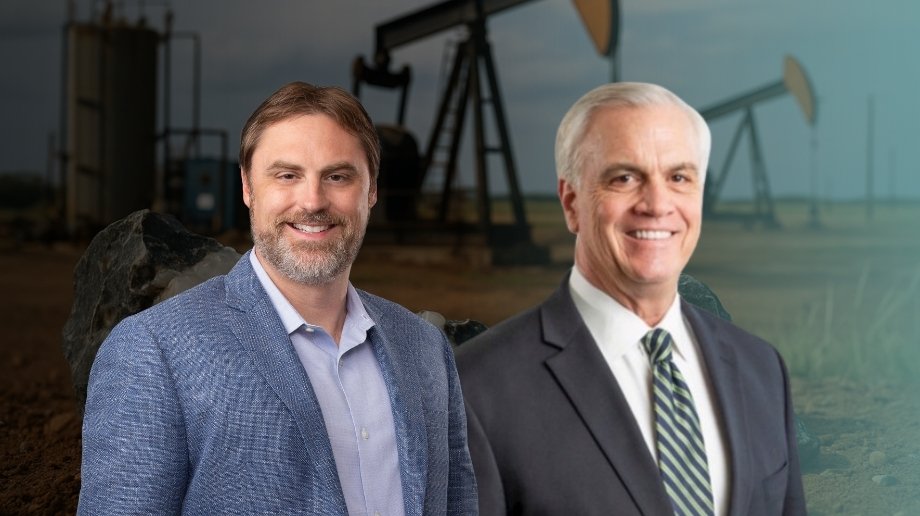Episode 7
OG Talks: Good Energy – Lithium, Mineral Rights & Legal Uncertainty in Oil & Gas
In this episode, Co-owner Brad Gibbs and Senior Counsel Chuck Lundeen break down how lithium extraction is intersecting with traditional oil and gas law. From the Smackover Formation to the Railroad Commission, this episode dives into the evolving regulatory landscape, mineral ownership questions, and how states like Texas, Arkansas, and Oklahoma are handling lithium’s rise.
Key topics covered:
- The legal implications of direct lithium extraction (DLE)
- How Arkansas has defined brine as a mineral and why that matters
- Why Texas still hasn’t formally classified lithium
- The ownership debate: surface owner or mineral owner?
- China’s growing control over global lithium supply
- The economic limitation of lithium production in Oklahoma
- How lithium fits into the broader energy transition narrative
- Why oil, gas, and lithium are not in conflict
Transcript
Hello out there. This is Brad Gibbs for the Leave A Give. Thank you for joining us again on this good energy talks. We are here today in Midland, Texas, the real energy capital of the world, even though Houston likes to claim that title. And I’m here with a Midland OG himself, a Midland native, Chuck Lundin.
Chuck, thank you for joining me today.
Thank you, Brad. Glad to be here.
Chuck has a wealth of experience, in the industry, both as an oil and gas attorney with our firm and as a land manager with, Devon and WPX. Right? Correct.
So, Chuck, what’s what’s your favorite memory of growing up in Midland?
My favorite memory is just all of the oil and gas people that my parents introduced me to. The the oil and gas industry is such a tight mid group, and it’s just, you know, when we come back here, I still see the same people and, their families that did an oil and gas business. And, it’s just a real joy to be here and be with industry people.
And, Chuck grew up, just about a mile from the location where we’re filming today, and lived here for, much of his childhood. And would you say Midland has changed a lot since then?
Yeah. For the better. I think it’s, it’s grown immensely for all new office buildings out on Dorset. They got a loop now with restaurants, and, all the chains are here.
All the fun things to do are here. But downtown has maintained its, beauty of an old town view. I I love downtown Midland. A lot of it is not it is a lot of it has remained unchanged.
Yeah. Wall Street is just such an iconic, part of Midland, and, I love downtown, and we love Midland and try to get out here every chance we can get. And, we’re here today to talk about something, that’s been coming up a lot recently. I get phone calls about this, emails about this, quite a bit.
I’ve had the, opportunity to do some speaking and some writing on this topic, and that is lithium, and that’s what everybody’s talking about. And lithium is relevant both, here in the Permian, in the Permian Basin, and it’s also relevant, and maybe even more relevant on the East Coast of Texas and Arkansas in what’s called the smackover formation where they are looking at what’s called direct, lithium extraction. This is DLE technology. It’s a brand new emerging technology for extracting lithium, from saltwater brine that’s pumped deep out of the ground.
So that whole area and what’s the smackover formation now and, southern, southwest Arkansas and east Texas used to be under the ocean millions of years ago. And so there’s a lot of deposits of, different types of, salts, heavy metals, all kinds of things deep under the ground. And, what they realized back in the 50s that, that area might not be great for oil and gas because a lot of the wells were, coming out too watered out from all the brine production, and it wasn’t really economic but what they did realize was that the salt water there the brine was very rich in a lot of rare earth minerals and of course rare earth minerals are getting a lot of press these days.
We’re seeing places like China start to, you know, create artificial price wars, by slowing down supply, threatening to cut off supply, and it’s gonna be crucial, to the energy transition to a lot of what’s going on, in the country right now to, find new ways to to, produce this lithium and other rare earth minerals domestically.
And so Chubby and I are here today to talk about, kinda what’s going on in East Texas and Arkansas, and then Chuck’s gonna let us know a little bit about, Oklahoma and what’s going on there.
Yeah, Brad. And getting back to China, China controls about sixty nine percent of the rare minerals in in the world.
They just overtook Australia as the number two lithium producer.
They discovered a large field in the western China, and so they they’re increasing their their dominance right now.
Yeah. That’s exactly right. And with all the talk recently about tariffs, and different trade war, buzz that’s going on, China has threatened to reduce or cut off completely our supply of rare earth minerals, which could eventually include lithium as well because I think China is very aware of how dependent we are on that supply chain, and how much pressure they can exert on our prices, on our ability to manufacture, things like EV batteries and other lithium rich, manufacturing products here.
So what’s interesting, we’ve had the opportunity to work on a couple of, lithium projects in Arkansas and in East Texas and one of the big issues surrounding lithium is whether or not it falls within the definition of other minerals. So the reason that matters is because often when you see a severance of the mineral estate, that’s where you’re separating mineral ownership from the surface ownership, that will be a severance of oil, gas, and other minerals. And the question arises occasionally, as to what other minerals means exactly and there’s different tests that different states applied, there’s different minerals that have come in and out of economic fashion over the years and one now that’s obviously getting a lot of fuzz is lithium and there is some you know lithium at least in Texas has never been formally defined as a mineral.
Now we’ve got some similar substances, things like uranium that that share some similar properties. There’s a reasonably good chance that lithium, is a mineral, would fall under that definition of other minerals. In fact, there’s some legislation right now in front of the Texas senate that would actually define lithium and other brine minerals as part of the mineral estate. But Arkansas is interesting because while Texas still has a lot of question marks, Arkansas has actually gone as far as to define the brine itself as a mineral under what’s known as the strohacker doctrine and so what we see in Arkansas is a lot of these minerals you know, are actually defined by the courts, by statute, and you know depending on what date your minerals were severed then you may, than the brines that are going to entirely belong to the surface odor or the mineral owner without having to go through and parse, every single mineral in the brine and determine its ownership like we have to do in Texas.
And, Chuck, have you seen any of these questions start to come up in Oklahoma?
Not really. I mean, it, I spoke with, Matt Solomon who’s at Galvanic. It’s a newer company. A lithium can be actually located in Oklahoma.
They have no Oklahoma lithium production. The parts per million are just too low to make it economic. So basically, it’s only economic. So they’re in the smack over play also and, are competing with other companies.
Yeah. And and, I think that’s just it. You know, lithium, it’s it’s very hit or miss whether you’re gonna find a high enough concentration to make direct lithium extraction, economic. And I think that’s a big question that remains right now even in Arkansas, even in the smackover, even in these emerging lithium plays because nobody really knows, how well this technology is gonna work, what lithium prices are gonna do moving forward.
And so it’s all highly experimental right now. So what you’re seeing is a lot of very large players, you know, kind of eyeing the space. It’s your it’s your exons, you know, Equinor, very large companies who are kind of eyeing this area and are and are in the news or petitioning before the the AOGC which is the the Arkansas regulatory commission that oversees drilling these types of wells And, so they’re very prominently out there, looking at these plays, looking at at these emerging, this emerging technology. And it’s gonna be really interesting to see, how this works.
And fingers crossed, this is gonna be, a real opportunity for the U. S. To become less dependent on foreign lithium to start being able to rely on our our own stream of supply here and with a lot less environmental impact than you’re seeing in some of the other traditional lithium plays where they basically evacuate out the salt water out of giant evaporation pools. If you look them up online I mean you could tell they have a very large environmental footprint.
There’s also a hard rock extraction from a substance called spongamine it’s not a word you hear every day but that’s a very lithium rich, hard rock that could be crushed ground superheated and the lithium can be extracted that way. But this direct lithium extraction is is brand new and it’s a it’s a real opportunity to, find ways to, obtain lithium independence, and be a lot with a lot less of an environmental footprint. So pretty exciting stuff.
Getting back to lithium prices in now in twenty twenty two is when they peaked out. That was the peak. Since then, they back heel dropped a little bit. But in twenty twenty two is when you saw the influx of new companies coming in and getting into lithium business. So since that time, it’s leveled out a little bit, but with the China issues and whatnot, they expect that to rise.
Yeah. And that’s a great point, Chuck. And with the rise and fall of prices, we’ve seen, kind of waves of interest. And one of the big questions, outside of Arkansas where it can be pretty easily determined whether or not you’re gonna go in and lease the mineral rights from either the surface owner or the mineral owner.
In Texas, we’re seeing a little bit of a slower takeoff because of the fact that lithium has not been defined as a mineral. So one of the questions we get a lot is whether or not, you go lease the surface owner or the mineral owner in Texas. And it’s a it’s a it’s a question mark right now. Nobody really knows the answer to that.
And so we’re often advising companies that, you know, if they are trying to put together a potential lithium play, to probably go lease both because what is clear in Texas is that the mineral state, belongs to the mineral owner, that the groundwater that the lithium is suspended in belongs to the service estate. That’s very clear. But what the, they call them the constituent minerals in the brine, who owns those is still up for debate, with surface owners claiming that they own them and mineral owners claiming that they own them. And Texas has this kind of tortured way of going through and making that determination.
It has to be, you know, mineral by mineral, a determination made by the court. So lithium would have to be, you know, adjudicated to be a mineral unless the legislature steps in. And it’s also relevant out here in Midland because, a lot of times, the wells, even out here, are very high in what’s called produced water. So this is a wastewater that comes out of the well, along with the oil.
For a long time, it was seen as kind of a liability.
And, you know, by statute, operators had to take care of this, this wastewater and reinject it. Now, suddenly we’re seeing it, go up in value for refrac operations. You know, they want to recycle and reuse a lot of this produced water and so, there’s a lot of debate on who should own this produced water because it originally belongs to the surface estate but does it pass over to the, to the lessee under an oil and gas lease? Do they kind of take custody of it after that?
And then what happens if they if they decide there’s also lithium in this water? Who’s gonna own that? You know, is it is it the lessee? Is it the surface owner?
Is it the mineral owner? And nobody really has the answers to that right now, so it’s very difficult, in Texas to know how to put one of these plays together.
Yeah. From what I’ve seen in Texas and Louisiana, the surface owner can produce as much water as they want. In Oklahoma and seven other states, they can only produce as much as reasonably necessary. So it’s a little bit of difference in in a few of the states out there looking at it. Also, in Oklahoma, the former corporation, Kerishin, has no jurisdiction over lithium.
The last I checked, unless that’s changed reasonably, but they are only over oil gets, period. That’s that’s their jurisdiction.
Yeah. That’s that’s a really interesting point. So in Texas, I think there was a few, questions on that as well. And just recently, in fact, just about a month ago, the railroad commission, enacted, their their, regs that that directly, relate to lithium production at class five wells.
And, you know, so it’s very clear now that the Railroad Commission is going to, oversee the permitting, and production of lithium, but, you know, that’s also very recent development here as well. So I think the, the real, buzzword around lithium right now is uncertainty. Nobody really knows exactly where it’s going, whether it’s gonna be economic, you know, what this might look like in ten years. But what is very clear is that the US, has to find a way to become less dependent on foreign sources of lithium, especially as battery technology, remains, such an important, piece of the energy transition and kind of, you know what what’s going on where the world is headed so we’re very interested to see where lithium is headed and we’ve been very fortunate to be a part of some of these early lithium projects and to be able to consult with some of these companies and it’s a lot of fun because in many ways you’re flying a lot of traditional, oil and gas law in a new context.
And at the end of the day, it’s just federal rights. Alright, Shanta, I have a question for you. As a native Midlander, whose finger is kind of on the local pulse, how do you think the reaction is out in Midland to the idea generally of lithium being produced in Texas, and electric vehicles starting to, take over, you know, gas powered vehicles?
Yeah. I I don’t see any real concern.
The big trucks, the the equipment that is used is so reliant upon diesel and some of the fossil fuels that you just can’t be deplaced at this time with the technology that we have. That just would have replaced everything. There’s not a charging stations. The infrastructure just isn’t there. I don’t know if there’s any concern.
People are gonna buy electric cars to get a raft of time. As far as utility vehicles, word vehicles, those will remain also free.
Yeah, I think that’s right, and I think, you know, a big piece of it is just the battery storage. It’s, it’s, there’s just not enough. The technology hasn’t really caught up.
Yeah. Cold days, it drops some air for you.
Yeah. That’s exactly right. Especially if you’re talking about hauling a large load over a long distance, having to stop, you know, and and recharge frequently, not being able to just stop fill up, you know, in about, you know, half a minute. And, it’s, it’s I think the two are gonna are gonna kind of be complimentary to each other, and I just don’t see, there being that much competition in the long run. I think that, you can even see it in the news, in the industry, in the ESG talk. It was huge a few years ago. The, the narrative’s changed quite a bit, and it’s it’s less on, you know, setting a particular date for the energy transition to have taken place and more on, how are these two technology is gonna live together, kinda coexist.
And if anything, oil and gas is more crucial than ever fueling the transition, whatever that ends up looking like, Chris.
Yeah. Like t Putin Pickens said, he said the ice age didn’t end for a lack of ice, and the oil age will never end for a lack of oil.
So one thing I’d like to, remind everyone is that, you know, we are, Aliva Gibbs. We’re the OG dirt lawyers law firm. We are an oil and gas law firm through and through. And what’s great about, this idea of lithium, about this idea of, of batteries and and, you know, electricity storage is, a, this technology can be used to power, oil and gas drilling and technology in areas where it’s difficult to get electricity.
It’s difficult to, you know, bring power to some of these, drill sites, and, I think there’s a real place for lithium there. And also at the end of the day, a lot of the, folks who were able to, make a wonderful living, live a a wonderful lifestyle, off their mineral rights and mineral revenues, this is going to be a whole new source of potential revenue for them, you know, especially if they find out that they own, along with their mineral rights, these lithium rights. And, the fact of the matter is that, lithium’s not going anywhere, and we would rather be the firm that, you know, helps the oil companies navigate, the future as opposed to the firm that’s, that’s, you know, across the table problem.
So, we’re very fortunate to be able to kinda practice in both spaces.
Yeah. It’s another subject, but how’s how’s lithium pay past the royalty pay?
Yeah. That’s a great question. And, that’s another question mark. So, you know, we’re seeing a lot of different royalties starting to come out.
We’ve seen leases in Texas as high as about five percent and that’s about the highest I’ve seen on lithium. Now what you will see sometimes, especially if you’re a mineral owner on the Gulf Coast, something to be aware of is somebody might approach you and say, hey we want you to sign this oil, gas, and mineral lease. And if you look at the fine print, they may have no intention of actually coming in and producing your oil and gas. It’s actually a lithium lease.
It’s a lithium and brine lease And in the fine print of your lease, it’s going to say, you know, other minerals, brines, produced water.
Lithium will probably be specifically mentioned, and you’re gonna see, a much lower royalty on low. So it might say twenty five percent on oil and gas, and then down at the very bottom it’s gonna say something like two percent on lithium and other minerals, and we’ve seen that range from, you know two percent to about five percent.
Other countries, you know, it’s in that same range about three to five percent. And, one of the reasons that the Arkansas regulatory hearings on putting together, forced, brine pools fell apart is that nobody could agree on royalties. So, they wanted about, the operators, petitioned for about one point eight percent royalty. The mineral owners and surface owners came back and said, no way.
We want one eighth, you know, the traditional royalty for oil and gas. And so that was just so far apart that it fell apart. And then, there’s also some questions about, you know, how you’re gonna actually value, the lithium kind of at the mouth, mouth of the well. So very similar to the idea of, like, postproduction costs, and, taking natural gas and and condensing it and treating it and, separating it and and gaining in value as it moves further and further downstream.
Battery grade lithium is not gonna be the same as the lithium suspended in in, you know, brine at the mouth of the well. So you’re gonna have to figure out some way to, back out what the lithium is worth to the mineral owner versus what it’s sold for as battery grade lithium, you know, all the way down the lithium stream. So Sacrofrost is gas. Gas meant any heat process. That’s exactly right. Exactly right. Thank you everyone for joining us for this edition of OG Talks Good Energy, and hearing a little more about our lithium practice today.
Feel free to reach out anytime for, any and all of your lithium questions, and make sure that you subscribe to our newsletter, and check out the website for any updates on lithium law, lithium legislation, or anything like that. And if you do have any questions, feel free to reach out to Chuck or myself anytime. We’re happy to address them. Alright. I wanna thank Chuck again for joining me here in Midland today to talk lithium. Chuck, cheers. And remember, you can’t spell oil and gas without OG.
Featured in this podcast
Get expert legal guidance today
Contact us today to discuss your legal needs in oil, gas, and mineral development.




